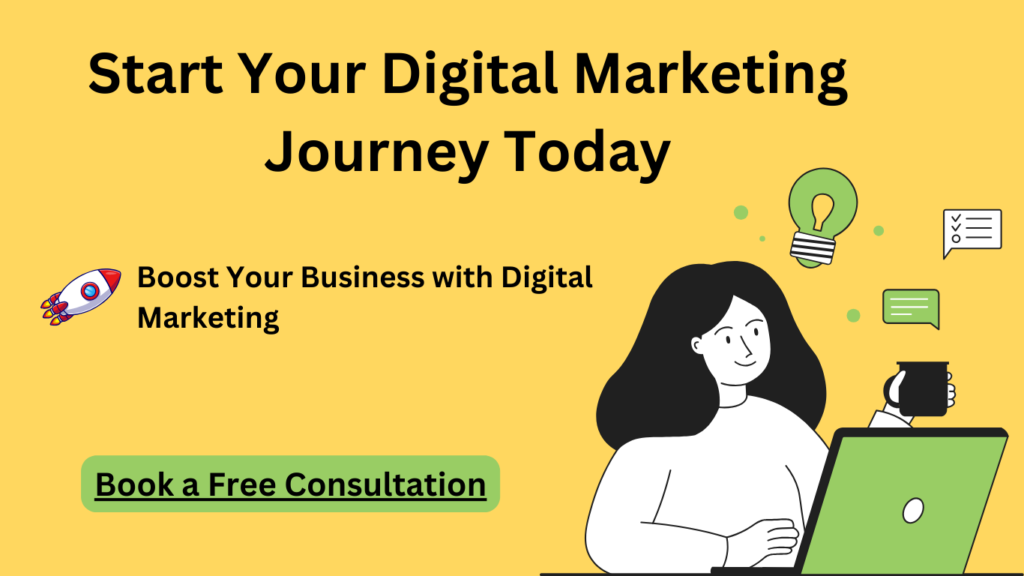Digital Marketing 101: A Beginner’s Guide to Small Businesses
Introduction
Nowadays, old-fashioned marketing techniques will never be able to launch a business. If you own a small shop, a service company, or an online store, you must possess the correct Internet marketing strategy if you want to target and connect with your potential customers. Internet marketing enables small companies to compete on the same level as giant corporations, create brand names, and sell products—at less expense than conventional advertisements. But what is digital marketing, and how do you implement it? This guide will take you through the basics of digital marketing, from search engine optimization and social media to email marketing and pay-per-click advertising. At the end of this guide, you will have a proper understanding of how to begin and expand your business using the application of digital marketing methods.
1. What is Digital Marketing?
Internet marketing is any kind of marketing that applies the use of the internet or electronic media. It involves a variety of strategies and media, such as social network sites, search engines, websites, and email, to connect with prospective clients.
Traditional vs. Online Marketing
There is conventional advertising which comprises mediums such as print, billboards, and television advertisements with high expenses and narrow audience reach. Online advertising enables firms to focus their exposure, measure their campaigns in real time, and make informed decisions.
Types of Digital Marketing
- Search Engine Optimization (SEO) – Optimizing sites for improved position on search engines such as Google.
- Social Media Marketing (SMM) – Promotion of products/services on Facebook, Instagram, and LinkedIn.
- Content Marketing – Creating valuable content to acquire and retain customers.
- Pay-Per-Click (PPC) Advertising – Paid search engine and social media advertising.
- Email Marketing – Targeted emails sent to engage with customers.
2. Why Digital Marketing is Important for Small Businesses
Digital marketing is not a trend; it’s a necessity for small businesses. Here’s why:
Affordable and Scalable Marketing Solutions
Compared to traditional marketing, which is costly, internet marketing permits companies to experience high coverage at a reasonable price. Small businesses can begin with little capital and increase it when the company matures.
Fighting Big Brands
With the right digital strategy, small businesses are in the same playing field as big businesses. Search engine optimization, content marketing, and direct social media advertising bring smaller brands onto the map and customers through the doors just as large brands do.
Data-Driven Decisions
Digital marketing provides real-time insight into what the customer is doing. Businesses can review information about campaigns, track performance, and adjust strategy for better performance.
3. Knowing Your Target Market
Before any marketing campaign, it is important to know your audience.
Building a Buyer Persona
A buyer persona is a fictionalized model of your target customer. It is information about age, gender, interests, pain points, and purchasing behavior.
Audience Segmentation
Segment your audience into demographics, interests, and behaviors to develop tailored marketing campaigns.
Tools for Audience Research
Use tools such as Google Analytics, Facebook Insights, and customer surveys to gather data and refine your marketing plan.
4. A Strong Online Presence
A strong online presence is the foundation of successful digital marketing.
Role of a Business Website
Your website is your online shop. It must be:
- User-friendly
- Mobile-responsive
- Fast-loading
- SEO-optimized
SEO-Friendly Website Practices
- Use related keywords.
- Image and meta description.
- Optimize site speed and navigation.
Google My Business & Local SEO
If you have a local business, you can get local customers by optimizing your Google My Business listing.
5. Social Media Marketing: Choosing the Right Platform
Social platforms are for different reasons.
Which Platforms Are Most Suitable for Your Business?
- Facebook – Most appropriate for creating a community and advertising.
- Instagram – Most appropriate for visually-based businesses.
- LinkedIn – Most appropriate for B2B marketing.
- Twitter – Best for live updates.
Content Strategies for Social Media
- Post frequently.
- Employ good-quality content.
- Engage with the audience via comments and messages.
6. Content Marketing: The Key to Engagement and Authority
Content marketing is value-given, not something sold.
Types of Content
- Blog posts – Drive traffic and SEO.
- Videos – Drive engagement and sharability.
- Infographics – Present information visually.
7. Creating a Content Calendar
A well-thought-out content calendar helps maintain consistency and keeps your marketing efforts aligned.
7. Search Engine Optimization (SEO): Organic Traffic Generation
SEO is crucial to get your site listed on search engines.
Keyword Research & On-Page Optimization
- Utilize tools such as Google Keyword Planner to find relevant keywords.
- Optimize titles, meta descriptions, and headings.
Link Building & Off-Page SEO
- Obtain backlinks from high-authority sites.
- Guest blogging and influencer outreach.
8. Pay-Per-Click Advertising (PPC): Instant Visibility on Search Engines
Google Ads vs. Social Media Ads
- Google Ads – Show ads to search query users.
- Social Media Ads – Show ads to users by interests and demographics.
Improving Ad Performance
- Set clear budgets and goals.
- A/B test ad creatives.
- Monitor performance metrics.
9. Email Marketing: Customer Relationship Building
Email marketing is a great way to nurture leads and retain customers.
How to Create a Successful Email Campaign
- Write good subject lines.
- Personalize the emails to increase engagement.
Automation & Segmentation
Automate email sequences and segment your lists using tools like Mailchimp and ActiveCampaign.
10. Monitoring and Measuring Your Online Marketing Efforts
What to Monitor
- Traffic to website
- Conversion rates
- Engagement
Top Analytics Tools
- Google Analytics
- Facebook Insights
- UTM tracking
Adjusting Strategies Based on Data
Use insight to shift future campaigns and maximize ROI.
Conclusion
Online marketing is a field that continuously evolves, but with the knowledge of the basics, small businesses can grow and flourish. Start small and small, try one or two approaches, and then build on it more as you become more confident. The secret to success is perseverance, flexibility, and continuous learning.
Are you prepared to propel your own small business to greater success? Implement these internet marketing strategies today, and see your business take off!


